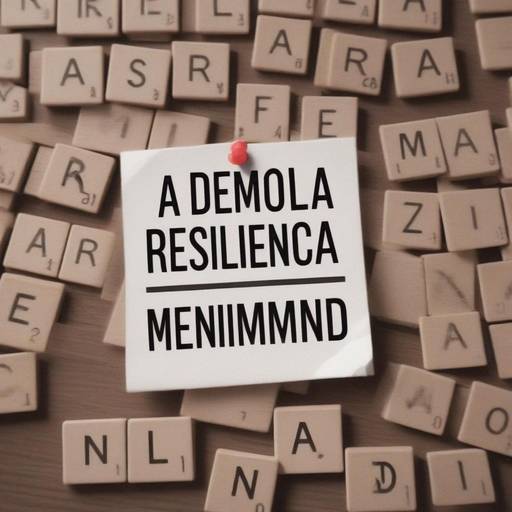
Resilience is a crucial skill for emotional well-being. In the midst of criticism, both constructive and destructive, resilience allows us to stand firm, learn and grow. In this article, we will explore in depth how to develop resilience to constructive criticism and its impact on emotional well-being. From its historical origin to practical advice and case studies, we will provide a complete and practical vision to strengthen this important skill.
Introduction
In the face of constructive criticism, it is common to experience emotions such as discomfort, defensiveness or low self-esteem. However, the ability to accept it in a serene way, to learn from it and to use it to grow is indispensable for our personal and professional development.
In this article, you will learn how resilience plays a fundamental role in confronting constructive criticism, how it has developed throughout history, its impact on emotional well-being and how to apply it in everyday situations. We will explore different approaches, practical advice, experts, and case studies to provide a complete understanding and deepen this crucial issue.
History and Background
Resilience, in its contemporary sense, has been related to the theory of stress and adaptation. However, their roots are found in fields as diverse as psychology, sociology and physics. In the 1970s, various professionals began to investigate the phenomenon of how some people managed to face extremely adverse situations and get strengthened, emphasizing adaptation and overcoming capacity.
For centuries, examples of resilience have been documented in various contexts, from historical narratives to personal accounts. These examples show human resistance to adversity, pointing to the inherent ability of people to recover, adapt and transform their lives.
Resilience, in its essence, is the ability to overcome adversity, learn from it and get strengthened. Throughout history, their understanding and application have evolved, and is now recognized as a crucial component of emotional well-being.
Analysis in Deep
Resilience, in the context of constructive criticism, is manifested as the ability to receive negative comments with openness, and to develop strategies to address them positively. While criticism can be challenging, it can also act as a catalyst for personal growth and development.
In analyzing different perspectives, we can understand how resilience allows constructive criticism to be addressed. Examining the psychological, emotional and social impact of resilience to criticism gives us a more accurate view of its importance for emotional well-being.
Building resilience to constructive criticism involves understanding the nature of criticism, recognizing our emotional reactions, and developing skills to manage and use criticism positively.
Comprehensive review
In applying resilience in the context of constructive criticism, it is essential to consider the various strategies and approaches that can be used to deal with it constructively. Reviewing case studies, best practices, and current trends allow us to understand how different approaches can influence results.
Understanding in depth the current benefits, challenges and trends in building resilience to constructive criticism gives us an integral perspective on its impact on emotional well-being.
Comparative analysis
By comparing resilience, constructive criticism, and emotional well-being, we identify similarities, differences and synergies between these concepts. Exploring concrete examples allows us to visualize how resilience acts as a bridge between constructive criticism and emotional well-being, demonstrating its crucial role in these areas.
By considering the links between these concepts, we can appreciate the importance of resilience in the management of constructive criticism and its impact on emotional well-being.
Practical Tips and Accessible Tips
In facing constructive criticism, it is crucial to have practical strategies to develop resilience. Providing concrete advice, follow-up and practical exercises provides readers with tangible tools to strengthen their resilience and manage constructive criticism.
Here are some practical tips to develop resilience to constructive criticism:
- Keep an open mind: Accept criticism as an opportunity to grow and improve. Keep an open mind and recognize that constructive criticism can offer valuable insights.
- Practice self-reflection: Take the time to reflect on your emotional reactions to criticism. Identify your strengths and areas of improvement.
- Learn to differentiate between constructive and destructive criticism: Recognize the difference between the criticism that seeks to help you improve and the negative criticism that does not contribute value.
- Develop assertive communication skills: Learn to express your views in a clear and respectful way, both by receiving and giving constructive criticism.
- Encourages emotional resilience: Dedicate time to activities that strengthen your emotional resilience, such as meditation, physical exercise, or the practice of hobbies that passionate you.
Perceptions of Industry and Expert Reviews
In order to achieve an integral vision, it is crucial to consider the perceptions and opinions of experts in psychology, personal development, and emotional well-being. By bringing together industry perceptions and expert opinions, we can identify emerging trends and innovative perspectives on resilience to constructive criticism.
Experts highlight the importance of integrating resilience as a crucial component in managing constructive criticism, and its positive impact on long-term emotional well-being.
Case Studies and Practical Applications
Case studies offer a detailed view of how resilience to constructive criticism is applied in various contexts. In analyzing real cases and their results, we can understand how resilience influences the management of constructive criticism and its impact on emotional well-being.
Through these cases, we can identify common patterns, challenges, and effective strategies to develop resilience to constructive criticism.
Future Trends and Predictions
The field of resilience and the management of constructive criticism is constantly evolving. Identifying emerging trends and anticipating the future of resilience development to constructive criticism allows us to be prepared for the challenges and opportunities to be presented in the future.
By analyzing current indicators and expert opinions, we can see how resilience to constructive criticism will remain a fundamental aspect of emotional well-being in the future.
Conclusion
In conclusion, developing resilience to constructive criticism is essential for our growth and emotional well-being. Through a comprehensive understanding of your history, practical applications, case studies, and future projections, we can strengthen our skills to face constructive criticism, thus promoting our personal and professional development.
Frequently asked questions
What is resilience and how does it relate to constructive criticism?
Resilience is the ability to adapt and overcome difficult situations, including constructive criticism. By developing resilience, we can face criticism positively, using their comments to grow and improve.
How can I learn to receive constructive criticism positively?
Learning to receive constructive criticism positively requires active listening, keeping an open mindset and keeping calm. It is important to appreciate the value of the comments received and to be willing to work on improving based on them.
What is the difference between constructive and destructive criticism?
Constructive criticism aims to provide useful and constructive comments to help the person improve, while destructive criticism seeks to hurt, discredit or devaluate without providing constructive solutions or benefits.
How can I develop emotional resilience to constructive criticism?
Developing emotional resilience involves cultivating skills to regulate emotions, practicing self-compassion, seeking emotional support and focusing on positive solutions to constructive criticism.
What are the benefits of receiving and applying constructive criticism effectively?
By effectively receiving and applying constructive criticism, we can improve our skills and performance, strengthen our interpersonal relationships, and grow in various aspects both personal and professional.
How can I cultivate an environment that fosters constructive criticism?
Fostering an environment that values and promotes constructive criticism involves establishing an open feedback culture, fostering trust and mutual respect, and recognizing and rewarding the ongoing improvement effort.
What impact does it have to develop resilience to constructive criticism of emotional well-being?
Building resilience to constructive criticism helps to strengthen self-esteem, promote personal overcoming, and improve emotional management, which has a positive impact on overall emotional well-being.
In short, by developing resilience to constructive criticism, we strengthen our ability to face challenges, learn from feedback received, and foster our emotional well-being. This skill is essential both in the personal and professional spheres, and in understanding its importance and applying practical advice, we can cultivate a constructive and enriching approach to constructive criticism.
With this article, we have explored in detail the historical evolution, practical applications, and the future of resilience to constructive criticism, providing readers with a complete and valuable insight into this crucial issue.






















































